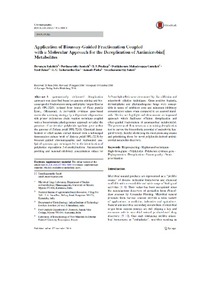Показать сокращенную информацию
Application of Bioassay-Guided Fractionation Coupled with a Molecular Approach for the Dereplication of Antimicrobial Metabolites
| Автор | Devaraju, Rakshith | |
| Автор | Parthasarathy, Santosh | |
| Автор | Pradeep, T. P. | |
| Автор | Doddahosuru, Mahadevappa Gurudatt | |
| Автор | Syed, Baker | |
| Автор | Yashavantha Rao, H. C. | |
| Автор | Azmath, Pasha | |
| Автор | Sreedharamurthy, Satish | |
| Дата внесения | 2018-02-07T07:30:07Z | |
| Дата, когда ресурс стал доступен | 2018-02-07T07:30:07Z | |
| Дата публикации | 2016-12 | |
| Библиографическое описание | Devaraju, Rakshith. Application of Bioassay-Guided Fractionation Coupled with a Molecular Approach for the Dereplication of Antimicrobial Metabolites [Текст] / Rakshith Devaraju, Santosh Parthasarathy, T. P. Pradeep, Mahadevappa Gurudatt Doddahosuru, Baker Syed, H. C. Yashavantha Rao, Pasha Azmath, Satish Sreedharamurthy // Chromatographia. — 2016. — Т. 79 (23-24). — С. 1625-1642 | |
| ISSN | 00095893 | |
| URI (для ссылок/цитирований) | https://link.springer.com/article/10.1007/s10337-016-3188-8 | |
| URI (для ссылок/цитирований) | https://elib.sfu-kras.ru/handle/2311/69922 | |
| Описание | Текст статьи не публикуется в открытом доступе в соответствии с политикой журнала. | |
| Аннотация | A systematically delineated dereplication approach was described based on genome mining and bioassay-guided fractionation using endophytic fungus Xylaria psidii FPL-52(S) isolated from leaves of Ficus pumila Linn., (Moraceae). A polyketide synthase gene-based molecular screening strategy by a degenerate oligonucleotide primer polymerase chain reaction technique coupled with a bioinformatic phylogenomic approach revealed the presence of an iterative polyketide synthase gene within the genome of Xylaria psidii FPL-52(S). Chemical dereplication of ethyl acetate extract derived from a submerged fermentation culture broth of Xylaria psidii FPL-52(S) by bioassay-guided chromatographic and hyphenated analytical spectroscopic techniques led to the identification of polyketide mycoalexin 3-O-methylmellein. Antimicrobial profiling and minimal inhibitory concentration values for 3-O-methylmellein were determined by disc diffusion and microbroth dilution techniques. Gram-positive bacteria, dermatophytic and phytopathogenic fungi were susceptible in terms of inhibition zone and minimum inhibitory concentration values when compared to co-assayed standards. Herein, we highlight and demonstrate an improved approach which facilitates efficient dereplication and effect-guided fractionation of antimicrobial metabolite(s). The present work flow serves as a promising dereplication tool to survey the biosynthetic potential of endophytic fungal diversity, thereby identifying the most promising strains and prioritizing them for novel polyketide-derived antimicrobial metabolite discovery. | |
| Тема | Bioprospecting | |
| Тема | Hyphenated techniques | |
| Тема | High-throughput | |
| Тема | Polyketides | |
| Тема | Polyketide synthase gene | |
| Тема | Phylogenomics | |
| Тема | Dereplication | |
| Тема | Bioautography | |
| Тема | Strain prioritization | |
| Название | Application of Bioassay-Guided Fractionation Coupled with a Molecular Approach for the Dereplication of Antimicrobial Metabolites | |
| Тип | Journal Article | |
| Тип | Journal Article Preprint | |
| Страницы | 1625-1642 | |
| ГРНТИ | 34.15 | |
| Дата обновления | 2018-02-07T07:30:07Z | |
| DOI | 10.1007/s10337-016-3188-8 | |
| Институт | Институт фундаментальной биологии и биотехнологии | |
| Подразделение | Базовая кафедра биотехнологии | |
| Журнал | Chromatographia | |
| Квартиль журнала в Scopus | Q2 | |
| Квартиль журнала в Web of Science | Q3 |

